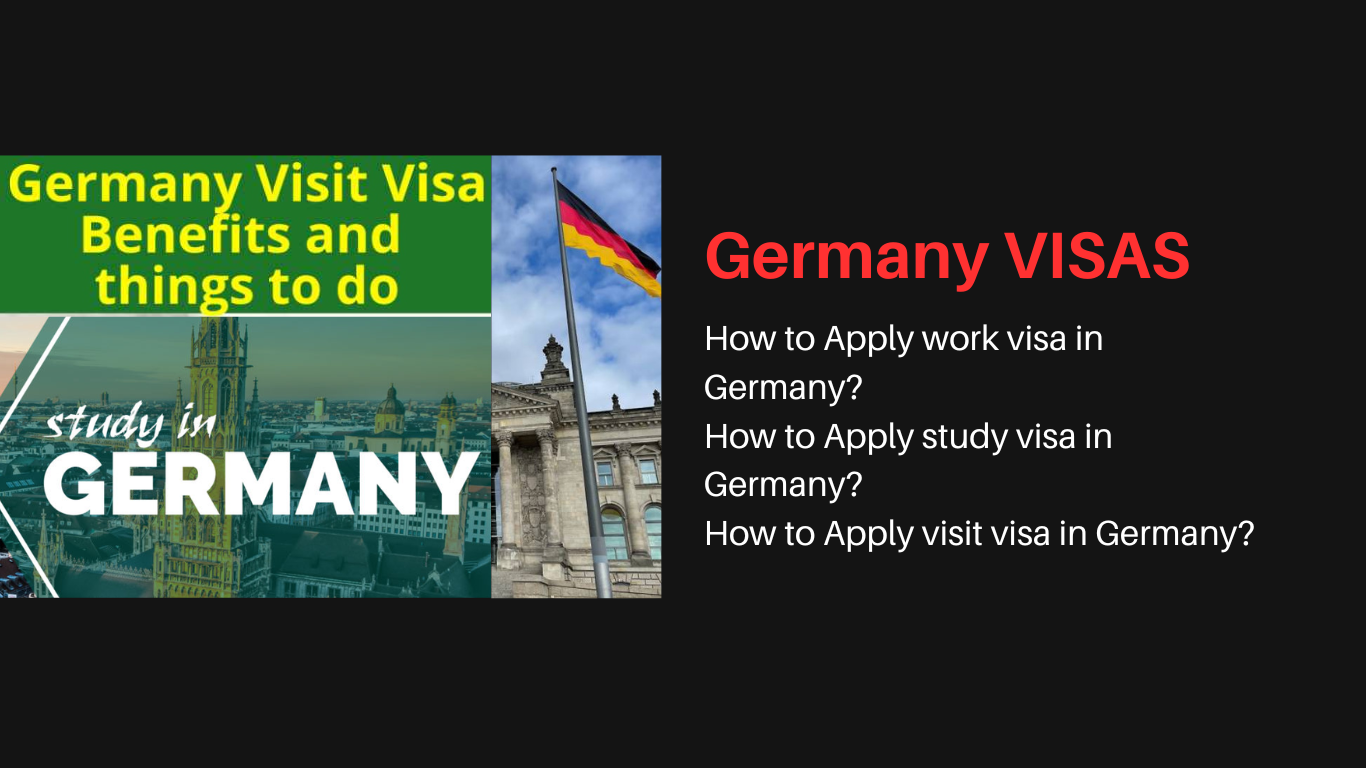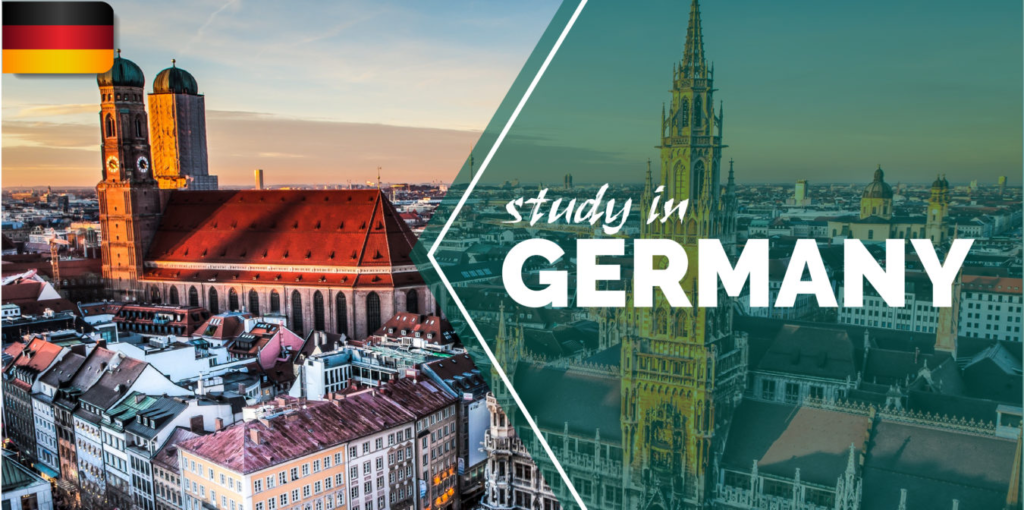How to Apply Work Visa for Germany

To apply for a work visa for Germany, you will generally need to follow these steps:
Determine the appropriate visa type: Germany offers different types of work visas depending on the purpose and duration of your stay. The most common types are the General Employment Visa and the EU Blue Card. Research which visa type is suitable for your circumstances.
Find a job: You typically need a job offer from a German employer before applying for a work visa. Look for job opportunities through online job portals, professional networks, or recruitment agencies. Ensure that your qualifications and skills match the requirements of the job market in Germany.
Read Also: How to Apply Work Visa for Italy
Gather the required documents: Prepare the necessary documents for your visa application. The exact requirements may vary depending on your situation, but generally, you will need:
- Valid passport
- Completed visa application form
- Two recent passport-sized photographs
- Proof of job offer or employment contract
- Educational qualifications and professional certificates
- Curriculum vitae (CV) or resume
- Proof of health insurance coverage
- Proof of financial means to support yourself in Germany
- Accommodation proof in Germany
- Other supporting documents as requested by the German embassy or consulate
Schedule an appointment: Contact the German embassy or consulate in your home country to schedule an appointment for your visa application. It’s advisable to do this well in advance as there may be a waiting period for appointments.
Attend the visa interview: On the day of your appointment, appear at the embassy or consulate at the designated time. Bring all the required documents, as well as photocopies, and be prepared to answer questions related to your employment, qualifications, and purpose of travel.
Pay the visa fee: There is usually a fee associated with the visa application process. Check the current fee amount and payment methods accepted by the embassy or consulate.
Wait for the visa decision: After submitting your application, the embassy or consulate will process your visa. The processing time may vary, but it can take several weeks. Be patient during this period.
Travel to Germany: If your visa application is approved, you will receive a visa sticker in your passport. Make travel arrangements to Germany and ensure that you have all the necessary documents for entry into the country.
Register in Germany: Upon arriving in Germany, you will need to register at the local registration office within a certain timeframe. They will provide you with a residence permit that allows you to work legally in Germany.
It’s important to note that the above steps are a general guideline, and the specific requirements and procedures may differ depending on your nationality, the type of work visa you’re applying for, and the embassy or consulate you’re dealing with. Therefore, it’s recommended to consult the official website of the German embassy or consulate in your home country for detailed and up-to-date information on the application process.
How to Apply Study Visa for Germany
To apply for a study visa for Germany, you will typically need to follow these steps:
Choose a university and program: Research and select a German university and study program that suits your educational goals. Ensure that the program you choose is recognized and eligible for international students.
Check visa requirements: Visit the official website of the German embassy or consulate in your home country to understand the specific requirements for a study visa. The requirements may vary depending on your nationality and the length of your intended stay.

Apply to the university: Complete the application process for the university and study program of your choice. Make sure to submit all the required documents, such as transcripts, diplomas, letters of recommendation, and a motivation letter. Adhere to the application deadlines set by the university.
Receive admission letter: Once your application is reviewed and accepted, the university will send you an admission letter. This letter is a crucial document required for your visa application.
Gather the necessary documents: Prepare the required documents for your visa application. While the specific requirements may vary, you will generally need:
- Valid passport
- Completed visa application form
- Two recent passport-sized photographs
- Admission letter from a German university
- Proof of financial resources to cover your living expenses in Germany
- Proof of health insurance coverage
- Educational certificates and transcripts
- Language proficiency certificates
- Proof of accommodation in Germany
- Blocked bank account (if required)
- Other supporting documents as requested by the German embassy or consulate
Schedule an appointment: Contact the German embassy or consulate in your home country to schedule an appointment for your visa application. It’s advisable to do this well in advance as there may be a waiting period for appointments.
Attend the visa interview: On the day of your appointment, bring all the required documents, along with their photocopies, and appear at the embassy or consulate at the designated time. Be prepared to answer questions related to your study plans, financial situation, and intent to return to your home country after completing your studies.
Pay the visa fee: There is usually a fee associated with the visa application process. Check the current fee amount and payment methods accepted by the embassy or consulate.
Wait for the visa decision: After submitting your application, the embassy or consulate will process your visa. The processing time may vary, but it can take several weeks. Be patient during this period.
Travel to Germany: If your visa application is approved, you will receive a visa sticker in your passport. Make travel arrangements to Germany and ensure that you have all the necessary documents for entry into the country.
Register in Germany: Upon arriving in Germany, you will need to register at the local registration office within a certain timeframe. They will provide you with a residence permit that allows you to study legally in Germany.
Remember that the above steps are a general guideline, and it’s important to consult the official website of the German embassy or consulate in your home country for detailed and up-to-date information on the application process. Additionally, universities in Germany may have specific requirements and deadlines, so it’s essential to closely follow their instructions as well.
How to Apply Visit Visa for Germany
To apply for a visit visa (also known as a tourist visa or visitor visa) for Germany, you will generally need to follow these steps:
Determine the visa requirements: Visit the official website of the German embassy or consulate in your home country to understand the specific requirements for a visit visa. Check if you need a visa based on your nationality and the length of your intended stay in Germany. Some countries have visa exemption agreements with Germany, allowing their citizens to enter for a specified period without a visa.
Gather the necessary documents: Prepare the required documents for your visa application. While the exact requirements may vary, you will generally need:
- Valid passport with a minimum of six months validity beyond your intended stay in Germany
- Completed visa application form
- Two recent passport-sized photographs
- Proof of travel health insurance covering the duration of your stay in Germany
- Proof of sufficient financial means to cover your travel expenses (e.g., bank statements, sponsorship letter, or traveler’s checks)
- Travel itinerary, including flight reservations and accommodation details
- Proof of ties to your home country, such as employment letter, property ownership, or family commitments
- Other supporting documents as requested by the German embassy or consulate
Schedule an appointment: Contact the German embassy or consulate in your home country to schedule an appointment for your visa application. It’s advisable to do this well in advance as there may be a waiting period for appointments.
Attend the visa interview: On the day of your appointment, bring all the required documents, along with their photocopies, and appear at the embassy or consulate at the designated time. Be prepared to answer questions related to your purpose of travel, itinerary, financial situation, and intent to return to your home country.
Pay the visa fee: There is usually a fee associated with the visa application process. Check the current fee amount and payment methods accepted by the embassy or consulate.
Read Also: How to Apply work visa in Dubai
Wait for the visa decision: After submitting your application, the embassy or consulate will process your visa. The processing time may vary, but it can take several weeks. Be patient during this period.
Receive your visa and travel to Germany: If your visa application is approved, you will receive a visa sticker in your passport. Make travel arrangements to Germany and ensure that you have all the necessary documents for entry into the country.
Entry and stay in Germany: Upon arrival in Germany, present your passport with the visa sticker to the immigration authorities. They will validate your visa and may ask you a few questions regarding your visit. Make sure to abide by the terms and conditions of your visa, including the duration of your stay.
It’s important to note that the above steps provide a general guideline, and the specific requirements and procedures may differ depending on your nationality and the embassy or consulate you’re dealing with. Therefore, it’s recommended to consult the official website of the German embassy or consulate in your home country for detailed and up-to-date information on the application process.